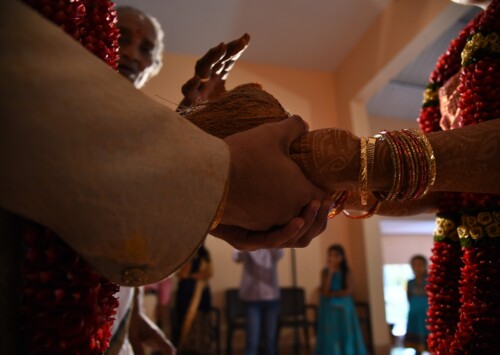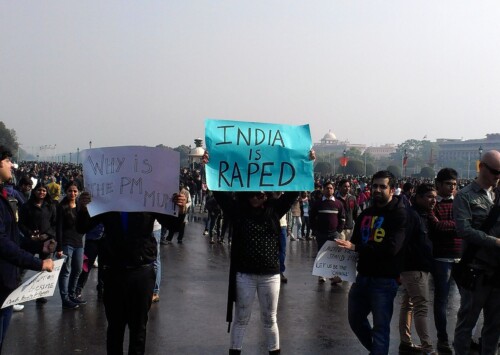Marital rapes in India: Attack on gender equality and women’s rights

Though urban women also face sexual abuse at home, marital rape may be far more prevalent in rural areas due to lack of education and financial independence of women (File Photo by Sarvani NGO)
Amongst the thousands of facts and figures published in the National Family Health Survey, published in 2015-16, there are startling facts about spousal violence and sexual exploitation of a married woman within the confines of her home. The survey says that 31 pc of married women between 15-49 years faced physical, sexual, emotional abuse or violence and 5.4 pc were also forced to have sex at some point, with physical abuse being the most common under marital rape.
“A 45-year-old woman came to us saying she was helpless as nobody could understand her situation. She told us that her husband was having forcible sexual intercourse with her and that she was a victim of sexual violence and harassment daily,” Drishti Kharbanda, social activist at Sarvani NGO in Chandigarh, tells Media India Group.
The woman went on to tell Kharbanda that she had been seeking help for many weeks and also discussed her problems with some, but they told her it was not rape as it happened between a husband and wife and told her to rather adjust with him.
There are frequent reports about such cases, but so far never has a man been found guilty or faced any action on account of marital rape. This is because the Indian law is very clear about absolving husbands from any rape charge even if they force and use duress or any kind of pressure to have forcible intercourse with their wives. The section 375 of the Indian Penal code (IPC) says that as long as the wife is not below 18 years of age, it cannot be considered a rape. The age was raised from 12 to 18 only in 2012 under Protection of Children (Sexual Offences) Act passed by the Parliament.
This blank cheque given to men to have sex with their wives without bothering to ask for their consent is an attack on gender equality and women’s rights, say activists. “Indian Constitution’s Article 14 talks about right to equality, but women face infringement in their rights in cases of marital rape and it takes away a woman’s basic rights and privacy,” Neetu Ojha, an advocate in Mumbai, tells Media India Group.
“Due to marriage, the sexual intercourse between husband and wife is legal, in this cases husband gains right over wife which become the sole reason of marital rape, even if it is unwanted sexual intercourse or penetration obtained by force. But under the law, the husband cannot be found guilty of raping his own wife on account of presumed matrimonial consent to cohabit,” explains Ojha.
Social pressure prevents abused women from seeking divorce
The activists say that culture and tradition have bound the Indian society since ancient times. Also, the patriarchal structure and stereotypes in the family have kept women under male domination in Indian households.
“Even we see, a lot of women who suffer from all kind of sexual harassment, physical violence, but only a few seek help and take a step to move forward alone. Marital rape is an issue nobody wants to discuss about even if it is nonconsensual. As soon as a woman gets married, her consent flies out of door, and her problems don’t even matter,” says Kharbanda.
“Regressive traditions and cultural conditioning, illiteracy and fear of ridicule by the society are the few reasons women don’t come forward and get divorced, but in recent times, a few have been coming forward and seeking divorce. This could be because of the rise of literacy, financial independence and awareness through social media. This could be propelling women to choose to be independent and get relief from a toxic relationship,” says Ojha.
Contrasting judgement of courts
That the issue and the law need a thorough review becomes evident from different rulings issued by Indian courts in cases concerning marital rape. Just last month, two separate high courts in India gave entirely opposing judgements in marital rape cases. While a judge in the Bombay High Court said it was not illegal to have sex without the will of wife and that marital rape was not a crime in India, while giving his order in a case where the plaintiff, a woman victim of marital rape, was paralytic.
Around the same time, the Kerala High Court, which was dealing with a similar case, ruled that marital rape was a cruelty and could be the basis of divorce. The ruling has been welcomed by a number of women activists.
“A woman has every right to get off from a relationship when her consent is not valued, and a married woman too has the right to have her own privacy. India should come with a strict law to prohibit every aspect of violence against women,” says Kharbanda, supporting the court’s ruling.
Ojha explains that the law remains ambiguous and needs to be amended in order to reflect the current society. She also believes that having marriages governed by different personal laws could be responsible for women’s rights being denied and she advocates for a Uniform Civil Code that is in touch with the current realities of the Indian society.











